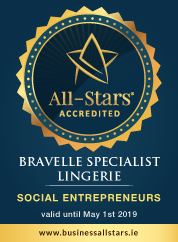For advice on any of our products, telephone Pauline (061)351886 or mobile (087) 9397899, or email info@bravelleshop.com
The HSE have announced new allowances for post mastectomy garments and ALL ladies who wear a breast prosthesis now qualify for them, including non-medical card holders.
If you are resident in Ireland and wear a breast prosthesis as a result of cancer related surgery, you can avail of this annual allowance.
New HSE allowance for bras and prosthesis
New HSE allowance for swimwear and prosthesis for swimming.
Please contact us for more details on HSE applications.
Most of the Health Insurance Companies provide cover for prosthesis, prosthesis bras and prosthesis swimwear. Contact them details of same.
This section is for those who would like more information on breast prostheses. It describes what prostheses are, the different types available, and how to choose and look after a prosthesis. It also explains how to get a new prosthesis if you already have one.
A breast prosthesis is an artificial breast form that fits in a bra cup to replace your natural breast. It is most often used after surgery for breast cancer, either after a mastectomy (removal of the breast) or a wide local excision (removal of a lump and some surrounding tissue). A well fitting prosthesis can help your posture and give you a more natural shape. Prostheses are made from silicone gel moulded to form the natural shape of a woman’s breast, sometimes including the nipple outline. The surface feels soft and smooth. The underside of a prosthesis is more variable. It can be firm and smooth or may have ridges that are soft and flexible. A breast prosthesis may feel cold at first but it warms up quickly with body contact. It may also seem heavy, but the sense of weight disappears once it is held against your chest wall and supported by your bra.
There is a wide range of prostheses available in different shapes, sizes and skin colours. They are made from materials that resemble the movement, feel and weight of normal breast tissue. A properly weighted form provides the balance your body needs for correct posture. You should be able to find a prosthesis to suit your particular needs. The most common type of prosthesis rests against your chest wall and is held in place by your bra, although there are a number of different types to choose from.
If you have had a wide local excision you may not have lost much breast tissue but it may be enough to make your breast shape different. This will depend on the size of your breast and where the lump was, and will affect the type of prosthesis you need. You may need a ‘shell’ type prosthesis which is hollow and fits over your remaining breast tissue, restoring your breast to its original shape. Or you may need a small, wedge-shaped prosthesis to fill out the bottom, top or side of your bra.
Most prostheses are made to weigh the same as your normal breast, although some women find that these still feel too heavy. You may prefer to wear a lightweight prosthesis. These are also made of silicone but they weigh less than standard prostheses.
Yes you can. A temporary prosthesis is lightweight and fibre-filled and can be worn immediately following surgery. Whatever type of surgery you have had you will not be able to wear anything that puts pressure on your scar and the surrounding area for six to eight weeks. When the scar has fully healed you may need to have further treatment such as radiotherapy, which can make the skin tender and sensitive for a while. You may not be able to wear a silicone prosthesis until this sensitivity has gone completely.
While your scar is healing you can use a lightweight temporary prosthesis made of synthetic washable fibre inside a cotton cover. Your breast care nurse or Reach To Recovery volunteer will provide this for you in the hospital. This well shaped temporary fabric form will help maintain your outward appearance during the initial period after your operation.
Some women find that a bra is too constricting during this time. If you prefer, you can wear a camisole top or a cotton vest with Lycra to give you support.
You might decide to carry on using these prostheses for leisurewear or at night.
To help you choose the right prosthesis you need to be seen by a breast care nurse or a trained fitter. You also need plenty of time and privacy. You might find it helpful to look at some breast prostheses so that you have an idea of what to expect, perhaps even before your operation. Your breast care nurse can show you some samples of different prostheses. If you would like to find out about the full range available, you can request a catalogue from Bravelleshop Tel: (061) 351886 or email info@bravelleshop.com
The breast care nurse or a trained mastectomy fitter will do the fitting for you. An appointment may be made for you before you leave hospital.
To make sure your prosthesis is comfortable and fits well you need to have a well fitting bra. Even if you think you know your bra size it is best to see a trained bra fitter. Pauline at Bravelleshop, Ballyneety, in Limerick, has had special training to fit women who have had breast surgery. You need to choose a bra that fits close to your chest wall between the cups, with enough depth of material between the cups to cover the prosthesis. The best result is usually obtained with a mastectomy bra, which has a pocket in the cup to hold the prosthesis. You can buy mastectomy bras from Pauline at Bravelleshop. Tel: (061) 351886 (087) 9397899
When you get fitted for your prosthesis it is a good idea to wear or take with you a plain, light-coloured T-shirt or close fitting top. This means that you can be sure you choose a prosthesis that gives you a smooth outline. You may also want to take a favourite bra or a low-necked dress that you would still like to wear. You may want to take a friend or partner along for support and to give their opinion.
It is important to look after your prosthesis carefully and follow the care instructions that come with it. Most prostheses should be washed every day with warm soapy water and patted dry with a towel. Always keep your prosthesis in its box when you are not wearing it so that it doesn’t get damaged. Prostheses are generally guaranteed for two years, as long as the care instructions have been followed, but often last longer.
All women who have had breast cancer surgery are entitled to their initial Prosthesis and two bras free of charge. Your breast care nurse will arrange a prosthesis fitting a few weeks after surgery.
If you need a replacement prosthesis and if you have a medical card, you are entitled to two bras every year and a breast prosthesis every two years, if required. In order to avail of this, you need to get a prescription from your local GP. Bring this prescription to Bravelleshop, who will process the application for you.
At Bravelle we want you to be very happy with the items you choose. We ask that you are 100% happy with your choice before purchase.
Due to the intimate nature of the items we stock we are unable to accept returns on breast prostheses or briefs. We accept returns on swimwear and bras, which must be returned to us within 14 days and in a re-saleable condition with all tags attached and original packaging intact.
Should you need to return a faulty product you will receive a replacement for the item.
Unfortunately, we cannot provide free postage on returns.
Private patients can buy replacement prostheses from Bravelle, Tel: (061) 351886, email info@bravelleshop.com. Most insurance policies will reimburse you for your prostheses, bras and swimwear every year. Others will cover a percentage of your prostheses costs. There is no excess on these day to day claims. You need to check your insurance policy to see what is covered and how you must submit claims. All necessary medical purchases can be claimed against tax.
We offer free delivery to anywhere in Ireland on all purchases over €50.
Purchases in Ireland, under €50, incur a €4 shipping charge.
Delivery charge to the UK is €10
Please contact me for delivery costs outside these areas.
Most women who are treated for breast cancer have some form of surgery. Regardless of your age or personal circumstances, it is understandable to have concerns about how you will cope with losing a breast. Whether this loss is partial or complete, any change to your body image can be a traumatic event. Many women who have been through this experience describe it as a kind of bereavement. If you have a partner or children you may have concerns about their reactions to your operation and to you wearing a prosthesis. You may worry that it is going to change the way they feel about you.
Recovering emotionally from breast surgery can take some time. Each person’s response is different so don’t worry too much if you feel you are not coping as well as someone else you know in a similar situation. If you are struggling or feeling isolated remember that there are people who can help you. Tell your family and friends how you feel so they can support you. You might want to talk to your breast care nurse.
You might find it easier to share your feelings with someone who has had a similar experience to you. Reach to Recovery is a programme set up to help and support women who have recently had a breast cancer diagnosis. The programme works on the principle of personal contact between the patient and a Reach to Recovery volunteer – a woman who has had surgery for breast cancer. Carefully selected and fully trained volunteers are available to provide advice and reassurance at a time when a woman is most in need of both. For more information on individual support or support groups in your area, call the Action Breast Cancer Freefone Helpline on 1800 30 90 40.
Action Breast Cancer is a national project established by the Irish Cancer Society to provide breast cancer information and support and to fund breast cancer research. Its services are free, confidential and accessible. For more information call the Action Breast Cancer Helpline on Freefone 1800 30 90 40 or visit www.cancer.ie




